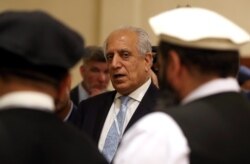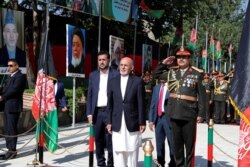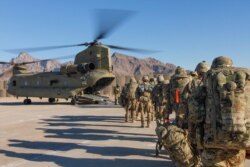With a draft peace agreement between the United States and the Afghan Taliban circulating after 10 months of negotiations, the insurgent group is pushing a new media campaign boasting about what it describes as the “success” of its past strict Islamic rule.
The Taliban was routinely condemned for brutal rule and violent tactics during its time in power in Afghanistan from 1996 to 2001, when it denied nearly all girls and women access to education and imposed strict rules over everyday life, such as a ban on television.
With the group on the verge of signing a peace agreement with the U.S. which could see an end to the 18-year-old Afghan war and the departure of U.S. and coalition troops by the end of 2020, it's revisiting its tenure in power.
“The Islamic Emirate (Taliban) foremostly prioritizes delivering freedom and prosperity to its country and oppressed people,” the Taliban asserted in a statement released Monday while referring to its controversial government in Kabul in the 1990s.
“No puppet government or organization has delivered success and progress to Afghanistan and its people in the way that the Islamic Emirate has and continues to do so,” it said.
The hardline group routinely refers to the democratically elected governments in Afghanistan as "puppets" of outside powers. That's one reason why the group has refused to hold formal peace talks with Afghan government representatives.
Under the draft peace deal between Washington and the group, the Taliban will be bound not to allow al-Qaida and other transnational militant groups to orchestrate international terrorism out of Afghanistan. But U.S. representatives say that does not mean the U.S. is considering abandoning support for the Afghan government and its security forces.
"No one should be intimated or fooled by propaganda. Let me be very clear: We will defend Afghan forces now and after any agreement with the Taliban,” U.S. chief negotiator Zalmay Khalilzad tweeted Monday. “All sides agree Afghanistan’s future will be determined in intra-Afghan negotiations.”
Taliban's track record
Monday’s Taliban statement runs counter to the fundamentalist group’s five-year rule when a strict version of Islamic law or Sharia was imposed in most of Afghanistan where girls were banned from schools and women from working outdoor.
The harsh Taliban regime, which was recognized by only three countries, including neighboring Pakistan, UAE and Saudi Arabia, had significantly reduced illegal opium-poppy cultivation in the country through a strict ban and established peace in much of Afghanistan, though critics often referred to it as “peace of the graveyard”.
A U.S.-led military coalition ousted the Taliban in late 2001 for sheltering al-Qaida leaders accused of plotting deadly terrorist attacks against the United States in September of that year.
The Islamist group later reorganized its ranks and launched an insurgency against subsequent U.S.-backed Afghan rulers. The Taliban currently controls or hotly contests almost half the country’s 407 districts, according to U.S. military assessments.
The Afghan government, which has been excluded from the ongoing U.S.-Taliban talks, has warned it will not accept any peace deal that would undermine the current governing system and gains made under it, particularly in human rights and women freedom. This has raised fears Afghanistan could return to the civil war of the 1990s if foreign troops pull out from the country.
The Taliban in its statement Monday dismissed those concerns as propaganda by Afghan officials to extend their rule. The insurgent group rejects the government in Kabul as illegitimate and an American puppet, refusing to engage in any peace process with it.
“It is only those few sections of Afghan society that were imposed on Afghanistan with the help of American weapons and dollars whom remain terrified of the Islamic Emirate’s reign,” it said.
Afghan President Ashraf Ghani’s aides have said a U.S.-Taliban deal must be shared with Kabul before it is signed. They insist any deal must lead to a nationwide ceasefire and direct peace talks between the government and insurgents. Ghani in a television interview last week vowed ”to save the system at any cost.”
On Saturday, the Taliban released a video of its Qatar-based chief negotiator telling a gathering that peace will stem from the deal with the U.S.
“I assure the people of Afghanistan that there will be no civil war in Afghanistan after the peace agreement is signed,” insisted Sher Abbas Stanekzai, the head of the Taliban team holding negotiations with Khalilzad’s team.
Stanekzai went on to assert Americans are “on the run”, saying the Taliban through its political and military polices is trying to force the foreigners out of the country as soon as possible.
More fighting after U.S. leaves?
The Taliban’s latest assertions strengthen concerns the group may not cease fighting and try to seize power in the absence of international forces. The rise in attacks by Islamic State also raises question wether the Taliban would live up to its counterterrorism commitments.
Republican Senator Lindsey Graham has been at the forefront in urging President Donald Trump not to order a large-scale troop drawdown from Afghanistan, warning it would threaten U.S. national security.
“If we leave and outsource our national security to the Taliban that they're gonna take care of al-Qaida and ISIS, that would be a disastrous decision,” Graham told CBS channel on Sunday.
Roughly 14,000 American troops are currently stationed in Afghanistan. Graham through media interviews and a newspaper article he wrote this month has been repeatedly calling on Trump to keep at least 8,600 troops in the country.
“They act as a virtual wall against ISIS and al-Qaida. You may get a peace deal with the Taliban, but you'll never get a peace deal with al-Qaida or ISIS. They have an intent to strike America. They just don't have the capability yet," Graham said.
Speaking to reporters in France Monday, Trump dismissed reports a U.S. troop drawdown timetable has been finalized in talks with the Taliban.
“No timeline whatever it is. No rush,” Trump said.
“We are there, we are really a police keeping force more than anything else frankly. So, we could win that war in a very short period of time but I am not looking to kill 10 million people. Okay. We are working along with the Taliban, with the (Afghan) government…and we will see what happens.”








